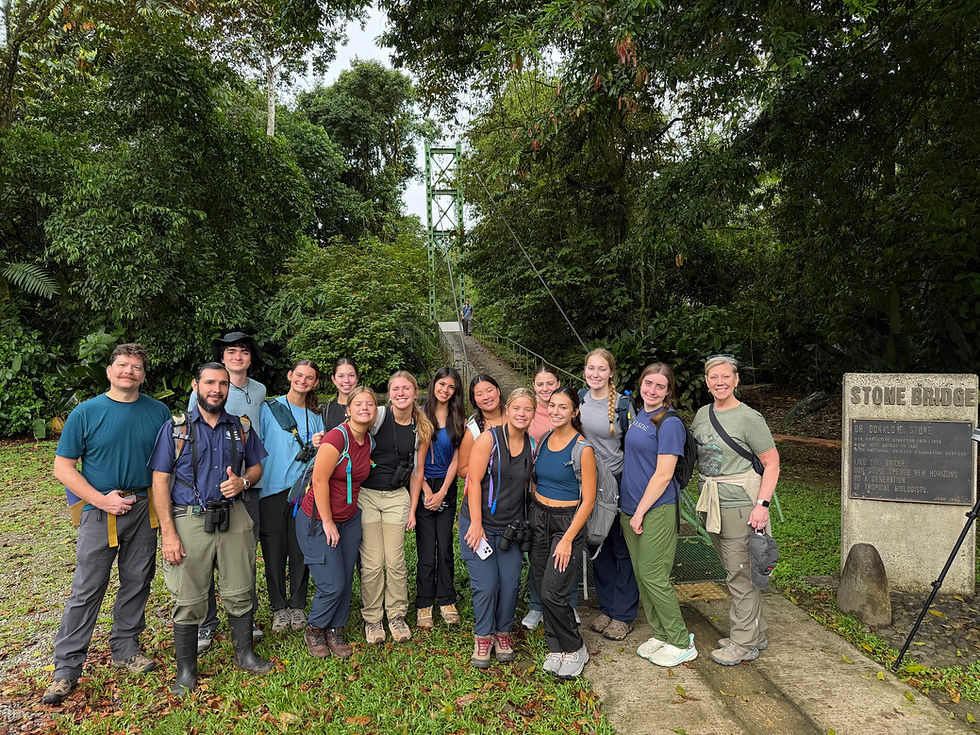How Small Creatures Teach Big Lessons
- NCHS
- Oct 21, 2024
- 3 min read
Every November, as the Nolan Ecology class treks through the Costa Rican rainforest, I often find myself at the back of the group. Not because I’m slowing down, but because I can’t resist the urge to crouch down and get a closer look at the forest’s intricate workers—the leafcutter ants. While the students charge ahead, eager to spot a sloth or spider monkey in the canopy, I linger, watching the ants methodically carve their paths through the jungle. I’m usually several paces behind, bent over, marveling at the precision of their work, often oblivious to the fact that I’ve been left behind until someone shouts, "Are you coming?" It’s moments like these that remind me just how much these tiny creatures have captivated my attention over the years.
My fascination with ecology and the delicate balance of natural systems didn’t start here, though. It began much earlier, during my time as a student at Nolan Catholic, where Dr. Joe Kuban—creator of the school’s ecology program—first inspired me. Dr. Kuban had a way of making the natural world come alive. He was the one who taught me to look beyond the surface and see the intricate connections that exist in ecosystems. Whether we were out in the field or in the classroom, he showed me how even the smallest organism plays a role in the grand design of nature. His passion for ecology was infectious, and it wasn’t long before I knew that I wanted to dedicate my life to studying these systems and sharing that knowledge with others.
One of the most valuable lessons I’ve learned, both as a student and now as a teacher, is that you can’t truly understand an ecosystem unless you spend time observing it up close. That’s why, even after all these years of leading students through Costa Rica, I’m still drawn to the ants. It’s in those quiet moments, crouched down at the back of the group, that I get to witness nature’s complexity in action. These ants, small as they are, are a living testament to the intricate balance that sustains the rainforest—and indeed, the entire planet.
During one of our hikes, a student asked me why we spend so much time talking about ants or other small organisms. “Why do we even care about bugs?” she asked. I stopped, gesturing to the forest floor bustling with life. “Look closely,” I told her. “Every creature here has a job, a purpose. If you take one out of the equation, the entire system can start to unravel.” I could see her wheels turning, and that’s what I love about these trips—the ability to make students see the bigger picture.
While the highlight for many students is spotting a sloth or spider monkey in the canopy, for me, it’s the ants. Their intricate division of labor, their role in soil regeneration, and their contribution to the forest’s overall health are all part of the larger lesson I hope my students walk away with—that everything in nature is connected.
It’s hard to convey that sense of wonder in a classroom alone, which is why these trips are so important. They allow students to experience the delicate balance of ecosystems firsthand. My goal is to take them beyond the textbook, to give them a sense of the awe I felt as a student when I first realized how interconnected everything in nature truly is.
Costa Rica’s rainforest is the perfect setting for that kind of revelation. Whether we’re examining the ants’ trails, hiking through dense foliage, or observing the immense biodiversity around us, I hope my students leave with the same appreciation for nature that Dr. Kuban instilled in me all those years ago. Watching them discover the connections between the smallest insect and the health of the forest as a whole is one of the most rewarding parts of these trips. It’s a reminder that the work I do isn’t just about teaching science—it’s about inspiring the next generation to care for the world they’re inheriting.
And if that means I’ll always be trailing behind the group, crouched down watching leafcutter ants work their magic, well, I wouldn’t have it any other way.
Mr. Garnett (‘99)
Ecology Honors and Earth & Space Science Teacher
.png)


